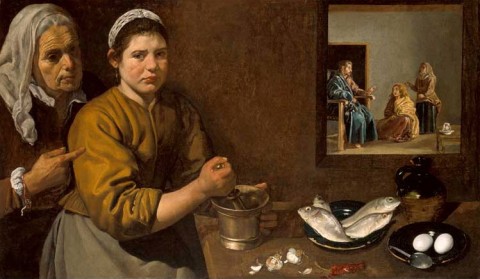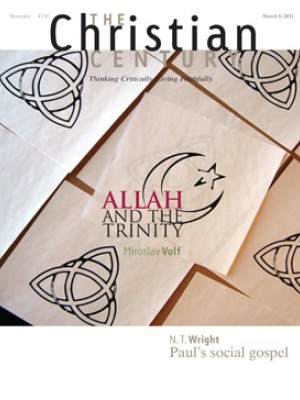Martha’s problem: What is the ‘better part’?

Framed by our kitchen window, a little brown house sparrow flits from one rhododendron branch to another. She looks nervous, fluttering and zipping from here to there, there to here—never pausing in one place for more than a second or two.
I can relate. My husband and I are having a dinner party tonight. The guests have all been invited, the house cleaned from top to bottom, the candles lit.
Cue the doorbell. Welcome the guests, take their coats and place them upstairs in the one perfectly manicured bedroom (keep the other doors closed!). Come down the stairs (smile!), make sure everyone has a drink, check the food, look relaxed. Invite everyone to the table, describe the menu, bring out the food, take a bite or two—slip back into the kitchen, assemble dessert.
Even when I'm at the table, truth be told, I'm not much fun. I'm more house sparrow than host. I flit and flutter, perching precariously on the chair closest to the kitchen, ready to zip from here to there, there to here: offering seconds, a refill, a napkin, a knife.
Read our latest issue or browse back issues.
I'm reminded of Martha, one of Jesus' hosts. Jesus is on his way to Jerusalem, where his friends will abandon him. He has already set his face toward the cross, but before he descends into the valley of the shadow of death, he passes through a small town where a woman named Martha welcomes him into her home, a soft nest in a hard, lonely world.
I imagine things unfolding this way: a neighbor casually mentions that Jesus is on the outskirts of town—and Martha takes to the air, flying out to meet him at a pace matched only by the father careening toward his long-lost prodigal son. Like that fearless father, Martha throws her arms around Jesus and happily leads him to her home. Then she disappears into the kitchen, brimming with culinary visions, while her sister Mary appears and sits down to listen.
Mary devours every word that falls from the young rabbi's mouth—which makes me wonder what on earth he was talking about. Was he reciting that epic poem of creation, the one from the first chapter of Genesis? Was he singing a song to end all songs, the one in which those young lovers whisper their secrets through the lattice? Was he teaching about the kingdom of heaven, how it's like a woman—a woman!—burrowing a little yeast into three measures of flour, and how the dough rises and rises, overwhelming the kitchen, overwhelming the world?
More often, however, my mind turns to Martha. What was she up to? Was she listening to all that talk in the other room? What was she thinking? And the meal: was it a feast to end all feasts? In her hospitable enthusiasm, did she bite off more than she could chew?
Scripture doesn't say. But if you listen closely, you can hear the pots and pans banging and the frustrated sighs growing deeper and deeper. When she finally storms out of the kitchen, bristling with resentment, she doesn't even address her sister directly. Instead, she goes straight to Jesus: "Lord, do you not care that my sister has left me to do all the work by myself? Tell her then to help me!"
Jesus says, simply and calmly, "Martha, Martha, you are worried and distracted by so many things. There is need for only one thing. Mary has chosen the better part, and it will not be taken away from her."
Let me be clear: this is not what Jesus is supposed to say. Take it from me, a classic Martha if there ever was one. He's supposed to say, "Martha, my little sparrow, you're right! You have chosen the better part. Very truly, I tell you: if you want to learn more about God, go straight to the kitchen!"
But Jesus says nothing of the kind, no matter how many times I read this sharp-edged little passage. He stands firm. Again and again, his words are the same: "You are worried and distracted by many things. There is need for only one thing."
For me, this rebuke cuts to the bone—and the pain is compounded by commentator after commentator, each upholding a dichotomy between labor and study, between "busy work" and "sitting at the feet of Jesus." I'm convinced this can't be right—and so I go back to the text and read it again.
Just before this episode, a lawyer asks Jesus about how to inherit eternal life. The answer is a familiar refrain: "Love the Lord your God with all your heart, with all your mind, and with all your strength—and love your neighbor as yourself." What follows, of course, is a story about how to love your neighbor, how to open your heart to one who is in need: the story of the merciful Samaritan. Then Luke records a story about how to love God with everything you've got: the story of Mary and Martha.
Martha is worried and distracted by many things. She's like that house sparrow, like me at the dinner party, never stopping long enough to linger, to savor, to delight, to be at home in the presence of God.
As I read the passage for the umpteenth time, something clicks: this is the "one thing"! Mary has chosen this single-minded savoring and delight, and it will not be taken away from her. The story is not a celebration of study or inaction or even of sitting still. It's a celebration of savoring, of delighting in God, of creating the possibility of sabbath even on the busiest of days.
By the same token, this story is not a critique of kitchen duty or the active life or just plain old getting things done. It's a critique of worry and distraction. It's a critique of being fragmented, of chasing after many things when there is only one thing.
Jesus stands firm for a reason: every one of us is called—commanded, really—to delight in God, our soft nest in a hard, lonely world. This is what Martha loses sight of and what all those commentators overlook.
The God who created creamy avocados and sweet corn on the cob, the God who let down manna from heaven, the God who even after death had a fish fry on the beach, is the God of grand dinner parties, soup kitchens, snacks and family meals. This is not a God against cooking or hosting or the menial labor that makes love possible.
So if study is your thing, by all means sit at the young rabbi's feet. If caring through cooking is your thing, or cleaning up or serving the poor or getting things done—do the same. For that young rabbi is everywhere. Delight in him. Savor him. Choose the better part.
Sing with Psalm 84: How lovely is your dwelling place, O God! My soul yearns, even faints, to be in your courts. My heart, my whole body sings for joy to the living God. Even the sparrow finds a home at your altars, wherever they may be—even the sparrow.
Cue the doorbell.






